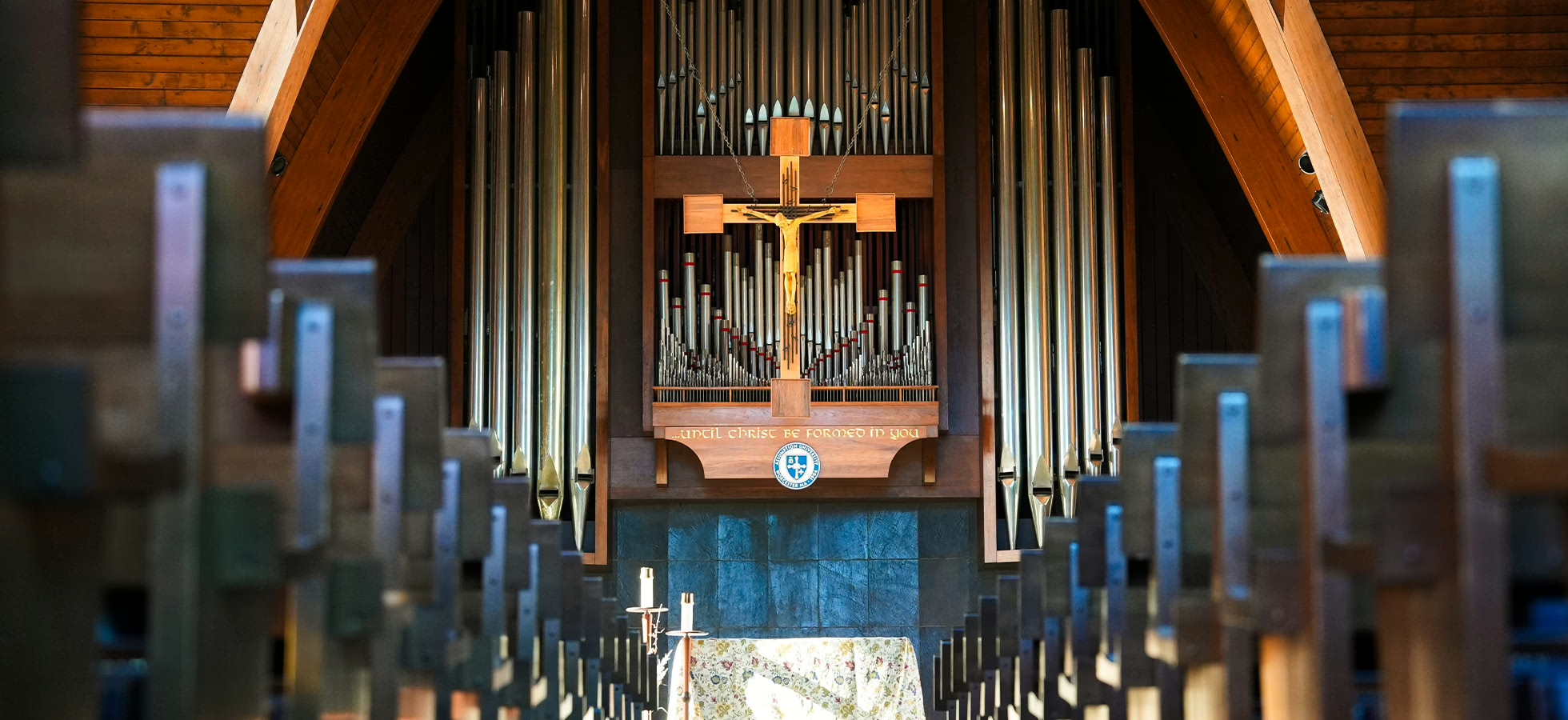A Pipeline of Excellence: Assumption’s Organ Scholarship

One of the grandest, oldest, and largest instruments on earth, known as the King of Instruments, can be found in the Chapel of the Holy Spirit—a pipe organ.
The organ found in the Chapel, the Gilbert and Anna Chabot Memorial Organ, was built in 1967 and installed at Assumption University in 1970. It was a gift from Fr. Gilbert Chabot, A.A., ’38, in memory of his parents, Gilbert and Anna. Fr. Gilbert was an organist, teaching the instrument to Assumption Prep students during his time as a Latin and religion teacher there from 1947 to 1970.
The Chabot Organ has over 3,000 pipes, upgraded from 1,100 pipes when it was originally built during an enhancement project completed in 1995. In comparison, the world’s largest pipe organ—found in Atlantic City, New Jersey—has over 33,000 pipes.
For over 50 years, the instrument has provided the Assumption community with music—and, for a select few, a special honor.
Since 2015, five Assumption students have been bestowed with this honor: a full-tuition scholarship in exchange for being the University’s official Organ Scholar. The title comes along with the responsibility of playing the Chabot Organ at a designated number of masses per week in the Chapel.
The organ scholars each train with a faculty member at Assumption. The scholarship began with Michelle Graveline, professor emerita of music; once she retired, Jonathan Bezdegian, campus minister for music and liturgical trips and adjunct faculty in the music department, began to work with the organ scholars. John Black, director of choral activities and lecturer in the music department, works with the current organ scholar Savina Villani ’27.
Each graduate of the organ scholarship program has gone on to work in or earn an advanced degree in the field of music. Jacob Dowgewicz ’15, went on to become Sales Manager at Austin Organs, Inc., in Hartford, CT, alongside serving as organist at the Cathedral of Saint Joseph, also in Hartford.
The next two scholars, Christian Copeley ’19 and Gabriella Lindhurst ’23, both went on to earn a Master of Sacred Music from the University of Notre Dame, and Copeley currently serves as Director of Music at Our Lady of Mercy Catholic Church in Merrimack, NH. Lindhurst recently returned to Assumption for a recital, performing works by Bach, Laurin, and Parker in the Chapel in March of 2025.
John Roper ’24, the most recent alumnus of the program, says that his interests in both organ and computer science led him to Assumption, as it was one of the only schools in the area that offered well-rounded programs in each.
Though he began his musical career playing the piano, he quickly found a love for the organ—as soon as a friend sent him a newsletter from the American Guild of Organists advertising a scholarship for a year of organ lessons.
“I started playing organ my sophomore year of high school and jumped in all the way,” Roper says. “I’ve always been a sort of mechanically minded person, as well as a musical person. The organ is big—it’s got a lot of buttons and switches; it’s intriguing from that aspect. I became interested in both the musical and mechanical side of the instrument.”
Now the owner of two businesses focused on both of his passions—one focused on organ restoration, consultation, and history (Plenum Organ Company) and the other focused on software development—Roper is working to help keep the tradition of the pipe organ alive for future generations.
“Having the organ scholarship not only gave me opportunities to learn, but it also gave me the freedom to go out and work on some of my own projects and interests,” he says. “Because of the scholarship, I was able to go out and start my businesses, which have both been informed by the education that I received here.”
Roper is currently working on two major projects to restore organs in New England—he is the organ consultant for both the Worcester Memorial Auditorium’s Kimball Organ and Hammond Castle’s pipe organ. Both organs have been dormant for over 20 years, he says, and getting more organs in working conditions helps bring people closer to music.
In addition, Roper was a part of a team that worked to help restore the aforementioned world’s largest pipe organ—the Midmer-Losh Organ at Boardwalk Hall in Atlantic City.
“I’m very invested in young organists, organ building, and bringing the organ to people—bringing more people to the instrument,” he says. “I’m convinced that it’s through exposure that people become interested in the organ, so the more instruments there are in working condition, and the more exposure that people have to events featuring the organ, the better.”
He also assists with various other organ projects and maintenance, such as maintaining the practice organ at his alma mater, Xaverian Brothers High School, and building a new practice organ for the art and music department here at Assumption.
The organ scholarship, Roper says, is also helping to keep the instrument alive, passing the art of the pipe organ to those who may not otherwise consider playing it.
“These instruments are the greatest of all instruments, the most complex, the most dynamic,” he says. “Programs like Assumption’s allow the organ to stay relevant and stay present. To have the ability to foster new interest in specialized topics is very powerful.”
